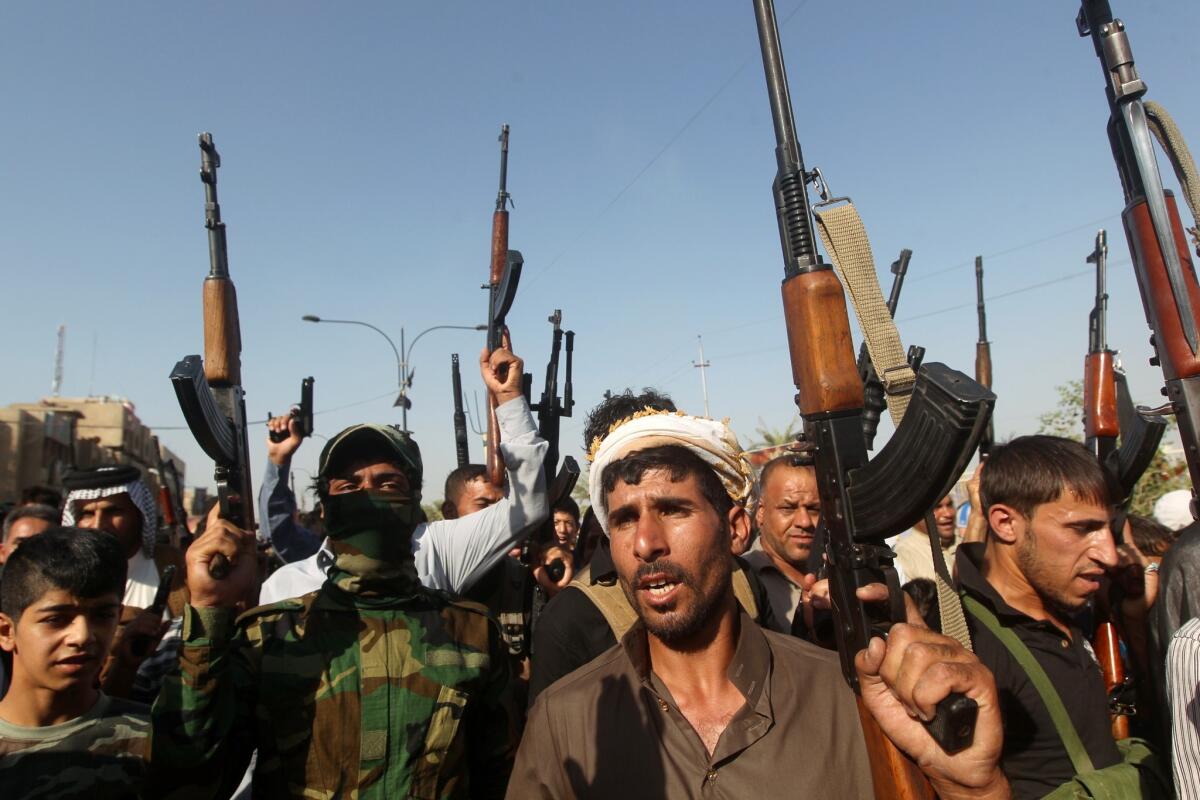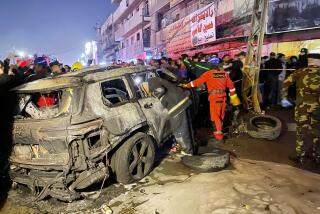U.N. pulls some staff from Baghdad as Iraqi forces attack militants

Pro-government forces in Iraq launched a counteroffensive Monday to try to retake a northern town seized by an extremist Sunni Muslim faction whose week-old onslaught threatens to dismember the country and touch off a bloody sectarian struggle.
Underscoring the menace posed by the fighters of the Islamic State in Iraq and Syria, or ISIS, the United Nations said it had moved nearly 60 staffers from Baghdad to neighboring Jordan with the intention of relocating them to northern Iraq. The State Department had said Sunday that the U.S. Embassy in Baghdad was taking similar measures.
The fast-moving crisis in Iraq has roiled the entire region and drawn urgent international calls for Prime Minister Nouri Maliki, criticized for favoring his own Shiite Muslim sect and excluding Sunnis from posts of power, to mend political fences and forge national unity against the attackers, whose offensive is an outgrowth of the civil war in Syria.
With Maliki insisting that territory lost to the militants would be regained, the government mobilized elite troops, local militias and its air force to try to wrest control of Tal Afar, an ethnically mixed town of about 200,000 people, from the ISIS fighters who had captured it overnight.
A small but strategically important city for its location about 90 miles from the Syrian frontier, Tal Afar fell before dawn to the ISIS forces who paraded through the streets waving their black banners and brandishing weaponry, according to residents and officials. Hundreds of families fled the jihadists’ advance, some seeking shelter in nearby Kurdish-controlled areas and others making camp in the desert.
Local security forces disappeared as ISIS fighters moved into Tal Afar, apparently fearing capture and death. A day earlier, the militant group had posted graphic images online purporting to show its fighters massacring dozens of captive Iraqi soldiers as they lay helpless and bound.
In an echo of that brutal tactic, the group claimed Monday it had captured the military commander in Tal Afar, Gen. Abu Walid, and proclaimed he would be executed in public. State television quoted the general as insisting he was free and busy on the battlefield but did not produce any audio or video to support the claim.
ISIS, with its stated ambition of creating a Muslim caliphate in a scythe-shaped swath encompassing parts of Syria and Iraq, last week overran one of Iraq’s largest cities, Mosul, following up with the capture of Tikrit, Saddam Hussein’s hometown.
Its fighters are also menacing Samarra, a Sunni-dominated city on the Tigris River about 80 miles north of Baghdad that is home to an important Shiite Muslim shrine. On Monday, state television broadcast military videos of what it said were air strikes on ISIS targets in and near the city. Armed Shiite volunteers have rushed to try to help defend Samarra, and on Sunday night, a convoy carrying some of them was ambushed. Activists said dozens were killed and injured but gave conflicting casualty figures that could not immediately be reconciled.
Elsewhere, the Iraqi military appeared to be trying to reverse losses suffered months earlier. The military commander in Anbar province claimed that artillery fire and airstrikes had killed “no less than 200 terrorists” near the western city of Fallouja, where ISIS took control in January. The report could not be independently verified.
So far, ISIS fighters have not attempted to move on the much more heavily fortified capital, Baghdad, or the Shiite-dominated south. But a government spokesman, Brig. Gen. Saad Maan Ibrahim, indicated that some militant elements were near the capital. Without giving details, Ibrahim told reporters on Monday that security forces had killed 56 “terrorists” in the previous 24 hours in clashes just outside Baghdad.
Responding to calls from religious and political leaders, Iraqi Shiites have flooded recruitment centers for fighting forces to supplement Iraq’s U.S.-trained army. Maliki vowed late Sunday at a visit to a military headquarters in Baghdad to repel the ISIS attackers.
The defeat of government forces “will not continue,” he said. “There is a sea of men marching to put an end to this.”
Special correspondent Bulos reported from Irbil and Times staff writer King from Cairo.
Follow Middle East news on Twitter with @laurakingLAT
More to Read
Start your day right
Sign up for Essential California for news, features and recommendations from the L.A. Times and beyond in your inbox six days a week.
You may occasionally receive promotional content from the Los Angeles Times.






